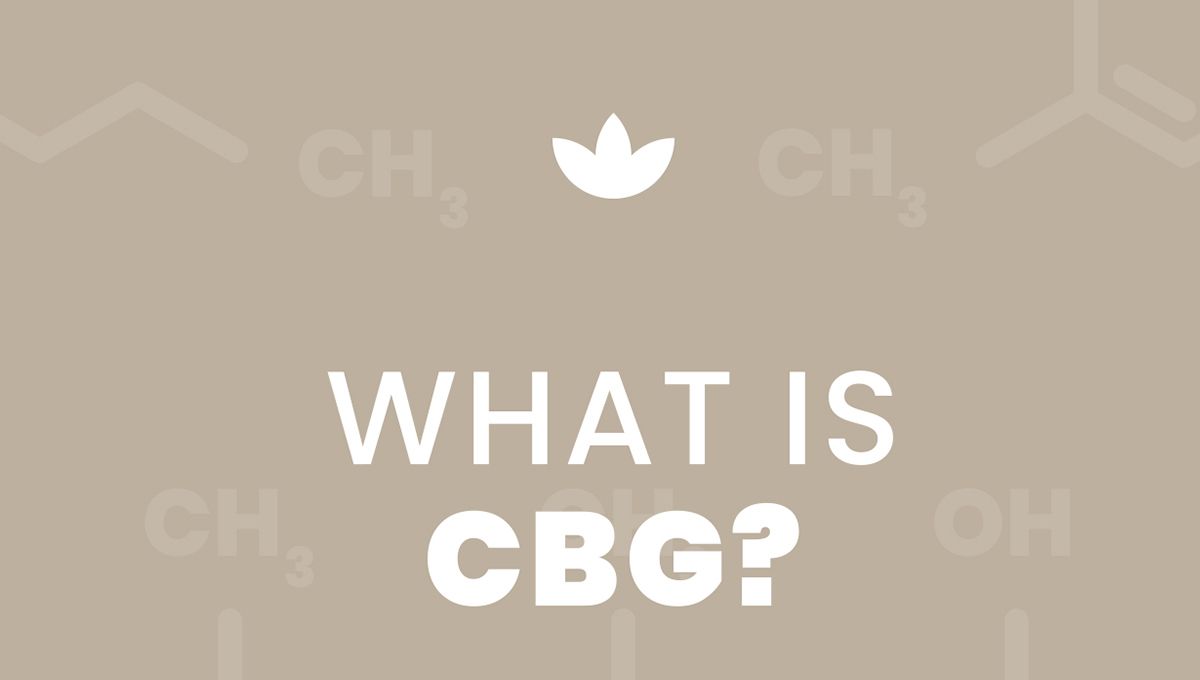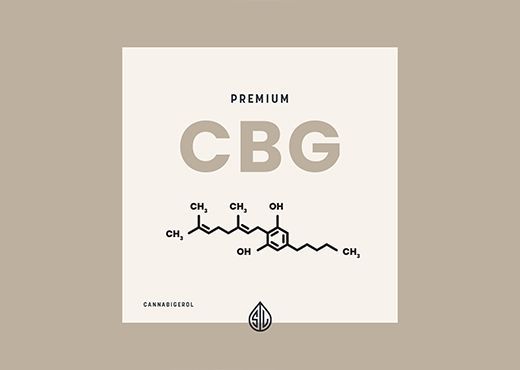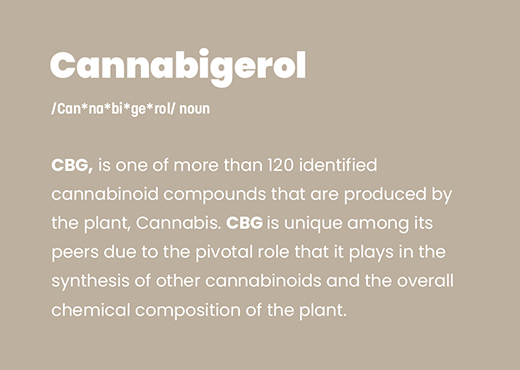So, you’ve heard of CBD and THC, but have you met their lesser-known cousin, CBG? No, it’s not a new boy band; it’s a fascinating compound found in the cannabis plant! Let’s dive into the world of CBG, explained in a way that’s as fun as it is informative!
CBG vs CBD
Everyone seems to be asking, what is CBG? What are the differences between CBG and CBD? The simple answer is…
CBD assists with the production and regulation of the body’s endocannabinoids.
CBG works by attaching to both of the body’s CB1 and CB2 cannabinoid receptors, potentially increasing the activity of anandamide, a chemical messenger involved in pleasure, appetite, sleep, and pain management. Unlike THC, it does not produce a psychoactive “high.
Unlike CBD, which has a relatively low affinity for cannabinoid receptors and works mostly via indirect interactions with the endocannabinoid system, CBG is thought to evoke its therapeutic effects through direct interaction with the CB1 and CB2 cannabinoid receptors in the brain. Another way to differentiate the two – CBG typically energizes, whilst CBD has a more calming effect. The two balance each other out when taken together.
Another major differentiator with CBG is that it is the precursor from which every other cannabinoid is synthesized, which is why it’s often referred to as the “mother” or “stem cell” of cannabinoids. This makes CBG unique to every other cannabinoid and it also brings a great therapeutic promise, making it the subject of great interest for researchers and consumers alike.
Table of Contents
What is Cannabigerol (CBG)?
First things first, let’s get our CBG definition straight. Cannabigerol, or CBG for short, is a non-psychoactive cannabinoid found in the cannabis plant. Think of it as the “stem cell” of cannabinoids—it’s the precursor from which other cannabinoids like CBD and THC are formed. Pretty cool, huh?
Cannabigerol is one of more than 120 identified cannabinoid compounds found in the plant genus Cannabis. Cannabigerol is the decarboxylated form of Cannabigerol acid, the parent molecule from which other cannabinoids are synthesized. Cannabigerol is a minor constituent of cannabis.
Cannabigerol, aka CBG, was first discovered in Israel in 1964 by researchers Yehiel Gaoni and Raphael Mechoulam, along with dozens of other cannabinoids. Shortly after this discovery, Gaoni and Mechoulam found a new neurobiological system, now known as the endocannabinoid system. While their later work mostly pertained to the effects of THC, their discovery has laid the groundwork for further research into this incredibly intricate plant and the corresponding functions within this system.
How Does CBG Make You Feel?
Ah, the million-dollar question: “How does CBG make you feel?” While individual experiences may vary, many users report feeling more relaxed, focused, and even energized after taking CBG. So, does CBG give you energy? Some people say yes! It’s not a stimulant, but it could help boost your mood and mental clarity.
Despite the long list of potential benefits of CBG, there is still a question of its effects and how it makes you feel. Since cannabinoids are obtained from traditional hemp plants (Cannabis Sativa), it is important to know what effects it has. THC, which is also derived from the cannabis plant has some adverse effects like mind impairment or intoxication. If you intend to use any of these compounds in the future, it is important to know how they will make you feel.
The straight answer to the question is that CBG does not have similar effects to THC. This means that it will not make you feel high or intoxicated just like CBD. Cannabigerol is not a psychotropic drug but is mildly psychoactive. However, it doesn’t impair reasoning like THC.
However, there is some evidence that when CBG is taken at higher concentrations, the patient may feel a mild sense of euphoria as well as some relaxation of the brain and muscles. so far, there is no report of people taking CBG and getting intoxicated or dizzy after using a higher dosage than usual. This means that CBG is very similar to CBD and may be used to promote sleep since it produces a calming effect.
Does CBG give you energy?
Well, CBG, or Cannabigerol, is like that mysterious cousin in the cannabinoid family who’s still revealing all their secrets. While CBG is often dubbed the “mother of all cannabinoids” (because it’s a precursor to other popular cannabinoids like CBD and THC), its energy-boosting potential is a topic of curiosity. Some users say that they enjoy the boost in energy, concentration, and creativity that CBG provides.
Now, to directly address the burning question: does CBG give you energy? Current research hasn’t definitively linked CBG to a surge in energy levels like your morning cup of coffee would. While research on CBG is still in its early stages, some studies and anecdotal evidence suggest that it may have a variety of potential health benefits.
As for whether CBG gives you energy, the evidence is not conclusive. Unlike THC, CBG is non-psychoactive, meaning it won’t give you a “high.” Some users report feeling more alert and focused after using CBG, but these effects can vary from person to person.
It’s essential to remember that everyone’s body is unique, and what might be an energy booster for one person might be a relaxation aid for another. So, while CBG might not be the next energy drink sensation, it’s worth exploring to see how it affects you personally.
It’s also worth noting that CBG may interact with other cannabinoids like THC and CBD to produce what is known as the “entourage effect,” where the combined effects of multiple cannabinoids may be different from the effects of each one individually.
If you’re considering using CBG for its potential energizing effects, it’s important to consult with a healthcare provider for personalized advice, especially if you’re taking other medications or have underlying health conditions.
In conclusion, while the exact answer to “does CBG give you energy” is still up in the air and requires more research, it’s an exciting area of study in the ever-evolving world of cannabinoids. So, stay tuned, and who knows? Maybe CBG will be the secret ingredient in your next energy booster!
CBG side effects
The limited research on CBG also means that there is no reliable information about potential side effects. From what we know, and from previous research on CBD, Cannabigerol seems to be very easily tolerated, has very low toxicity, and there have not been any significant side effects observed as long as it is consumed in normal doses. As always, it is advisable to consult with your physician before adding CBG to your regime, especially if you are taking prescribed medication.
Will CBG get me high?
No, CBG won’t get you high. Like CBD, Cannabigerol is mildly psychoactive but not psychotropic. CBG and CBD affect the brain very differently from THC, and they do not come with intoxicating effects. In high concentrations, CBG may induce effects of relaxation and euphoria, but the majority of the effects that this cannabinoid has on your system are not psychological.
The same rules apply to CBG. CBG isolate and broad-spectrum oil that contains CBG are generally safe to consume before a drug test. If your CBG oil contains THC, then there is a risk of a failed drug test—depending on the sensitivity of the assay and the THC content of your product.
Where does CBG come from?
You might be wondering, “Where does CBG come from?” Well, it’s naturally occurring in the cannabis plant, but it’s usually present in lower concentrations compared to its more famous siblings, CBD and THC. As the plant matures, CBG is converted into other cannabinoids, which is why it’s often called the “mother of all cannabinoids.”
How Is CBG Made?
CBG is derived from young cannabis plants because they contain higher amounts of CBG than fully developed plants. Some strains of cannabis like White CBG, Super Glue CBG, and Jack Frost CBG also have higher CBG content than other strains. These strains are specifically cultivated to produce higher quantities of CBG.
Both CBD and THC start as CBGA, an acidic form of CBG. This is why younger cannabis plants contain higher concentrations of CBG. In fully developed plants with high concentrations of THC and CBD, you’ll find very low concentrations of CBG. This happens because most of the CBG has already been converted to CBD and THC as the plant developed.
Due to the difficulty of getting CBG, cannabis growers have been experimenting with cross-breeding and genetic manipulation to help cannabis plants produce more CBG.
How does CBG work?
CBG is processed by the body’s endocannabinoid system. The endocannabinoid system is made up of molecules and receptors in our bodies that are responsible for keeping our bodies in an optimal state regardless of what’s going on in our external environment.
CBG & the Endocannabinoid System
So, after all the genetic engineering, what exactly does CBG do? On the surface, CBG has many similar effects as CBD, having been observed to combat pain and mitigate the intoxicating effects of THC without any psychoactive qualities (as in, it won’t make you feel a “high”). However, unlike CBD, CBG interacts with both CB1 and CB2 receptors. It has also demonstrated an ability to increase anandamide, or “the bliss molecule,” which plays a critical role in the regulation of many functions within the body including memory, pain, appetite, mood, and sleep.
CBG Scarcity
The production difficulties of CBG make it very scarce. It’s much harder to produce than other cannabinoids like THC and CBD. Since CBG shares many similarities with CBD, manufacturers would rather produce CBD. When CBG is produced, products derived from it are very expensive. However, CBG has a host of promising potential benefits and more research is being done into easing the production and availability of the cannabinoid.
Where to buy CBG products?
If you’re looking to buy CBG Simple Leaf sells Premium CBG manufactured from organic hemp grown in the USA.
CBG Explained: The Takeaway 🎉
So there you have it, folks! CBG is a fascinating compound with a lot of potential benefits. Whether you’re looking to relax, focus, or just learn something new, CBG might just be worth exploring.
Remember, always consult with a healthcare provider before trying any new supplements, especially if you’re pregnant, nursing, or taking other medications.
So, what’s CBG to you now? Hopefully, it’s a new and exciting topic you’re eager to explore further! 🌿✨
Happy exploring! 🚀
Article Sources:
Simple Leaf CBD uses only high-quality sources, including peer-reviewed studies, to support the facts within our articles. We fact-check and keep our content accurate, reliable, and trustworthy.
1. What is CBG? The minor cannabinoid with major potential explained. Journal of Cannabinoid Medicine.
2. Borrelli F, Fasolino I, Romano B, et al. Beneficial effect of the non-psychotropic plant cannabinoid Cannabigerol on experimental inflammatory bowel disease. Biochemical Pharmacology. 2013;85(9):1306-1316.
3. Colasanti BK. A comparison of the ocular and central effects of tetrahydrocannabinol and cannabigerol. Journal of Ocular Pharmacology and Therapeutics. 1990;6(4):259-269.
4. Valdeolivas S, Navarrete C, Cantarero I, Bellido ML, Muñoz E, Sagredo O. Neuroprotective properties of cannabigerol in huntington’s disease: studies in r6/2 mice and 3-nitropropionate-lesioned mice. Neurotherapeutics. 2015;12(1):185-199.
5. Farha MA, El-Halfawy OM, Gale RT, et al. Uncovering the hidden antibiotic potential of cannabis. ACS Infect Dis. 2020;6(3):338-346.
6. Orrego-González E, Londoño-Tobón L, Ardila-González J, Polania-Tovar D, Valencia-Cárdenas A, Velez-Van Meerbeke
A. Cannabinoid effects on experimental colorectal cancer models reduce aberrant crypt foci (Acf) and tumor volume: a systematic review. Evidence-Based Complementary and Alternative Medicine. 2020;2020:1-13.



